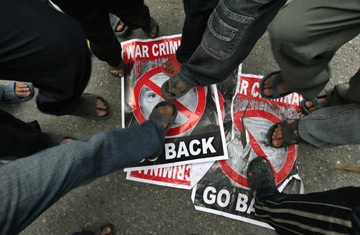
Palestinian supporters of the Hamas movement step on posters of US President George W. Bush during a protest against Bush's visit to Israel and Palestinian territories, in Gaza City.
As President Bush arrived on his first substantial tour of the Middle East Wednesday, he was saying many of the right things. He's touting the fact that he is the first American President to publicly support the establishment of a Palestinian state. All but some right-wing factions in Israel accept that a Palestinian state is essential for peace in the region. Bush is also promoting his "freedom agenda." That should be music to the ears of millions of Arabs, who have suffered under dictatorial rule for decades.
Then why are demonstrators, rather than approving crowds, going into the streets? "With all due respect," Rami Khouri, one of the Arab world's most thoughtful commentators, wrote on the eve of the President's arrival in Israel, "Bush might do the region and the entire world a favor by staying home." Why is Bush perhaps the most unpopular American President in history among the people of this region?
The problem, at least as seen from the Arab world, is that Bush's understanding of the Middle East and America's role in it differs greatly from the local perceptions, in three main areas:
1. Helping the Palestinians. Bush should get some credit for officially supporting a Palestinian state in 2002. Arabs are skeptical that this is the landmark breakthrough the White House makes it out to be. As far as they are concerned, the U.N. voted for Palestinian statehood as long ago as 1947. Palestinians felt let down and rose up in the second intifada in 2000 when the Oslo Accords of 1993 failed to deliver the statehood they expected after Palestinian leader Yasser Arafat recognized Israel's borders within 78% of the original territory.
Arabs cynically see Bush's endorsement of Palestinian statehood as part of the White House's effort to win Arab support at the time for the 2003 invasion of Iraq. Arabs note that until 2007, Bush shunned active Arab-Israeli mediation; he had refused to deal with Arafat, even though he was the elected President of the Palestinian people (as well as the symbolic leader of the Palestinian revolution), and still refuses to deal with the Islamist Hamas group, which won the 2006 Palestinian parliamentary elections. Even though Bush calls the November Annapolis peace conference a "major breakthrough" and says he's an "optimistic guy" about the chances of an Israeli-Palestinian peace agreement by 2009, he refuses to lay out his Administration's vision of a fair final settlement — something many experts see as an essential diplomatic step in breaking the long impasse between the parties. As Arabs see it, Bush's failure over the last seven years to exercise decisive U.S. influence over Israel, a close American ally, has simply enabled the Jewish state to expand its settlements throughout the occupied West Bank and made a viable Palestinian state much harder to achieve.
2. Promoting democracy. There are certainly people in Iraq, Lebanon and a few pockets here and there who are grateful for Bush's call for liberty in the Middle East. The problem is that it is widely seen as being insincere at best and hypocritical at worst. Few doubt that toppling Saddam Hussein's dictatorship was more about breaking Arab military strength and projecting American strategic power than fighting terrorism, much less creating Iraqi democracy. While Iraq is no longer a one-man show, it will be a very long time before anyone considers the country, now dominated by Shi'ite Muslim gangs, Kurdish warlords and Sunni terrorists, emblematic of an emerging democracy.
If the Iraq war was about Bush's freedom agenda, Arabs wonder, why has the White House stood by so quietly as pro-American authoritarian Arab regimes have jailed democracy activists, as happened to former presidential candidate Ayman Nour in Egypt? The White House stresses Bush's admiration for Saudi King Abdullah bin Abdulaziz and the country's baby-step municipal elections in 2005, yet Washington is silent about the systematic repression of women and minorities permitted in the name of religion in the Kingdom. If any Arab leader today deserves to be called a democrat, it's Lebanese Prime Minister Fouad Siniora, a humble economist by training who bravely continues to hoist the banner of the 2005 Cedar Revolution against domestic as well as foreign opponents. Bush won't have time for a stop off in Beirut, however. It could have been a powerfully symbolic show of support for Arab democrats; but Bush will be too busy after departing Israel meeting with oil sheikhs in the Gulf countries.
3. Confronting Iran. The Arabs are afraid of Iran, especially the Saudis and the emirs who rule the small oil-rich states situated just across the Gulf from the Persian giant. They are inclined to agree with Bush's worries about Iran's nuclear intentions. But they are even more concerned about another U.S. war in the Gulf — this time against Iran, to wipe out its nuclear program. That could bring a swift backlash, either through direct Iranian military retaliation against Washington's regional allies, or in the form of fomenting long-term political unrest and terrorism among Shi'ite minorities in those countries.
Arabs were relieved when the recent National Intelligence Estimate on Iran said that the Islamic regime had shelved its nuclear weapons program in 2003. But a major aim of Bush's tour is to rally Gulf Arabs into an anti-Iran bloc bent on further isolating Tehran diplomatically and economically, without giving up the option of a military attack on Iran, on the grounds that Iran remains a dire threat to regional security. To such logic, Gulf leaders are tempted to reply, "Duh, it was your ousting of Saddam Hussein's regime that enabled Iran to expand its influence in the first place." Arabs would never want Washington to get too cozy with Tehran. But they've had enough Texas gunslinging.
